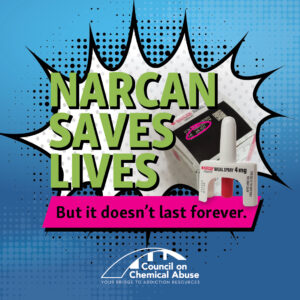The Council on Chemical Abuse provides Opioid Overdose Reversal Kits, which include Narcan® nasal spray, to all Berks County, PA residents, businesses, organizations, and agencies at no cost. Order a kit
Have a kit mailed to you by completing the form.
– OR –
Pick up a kit in person at one of the following locations between 8:00 a.m. and 4:00 p.m. Monday through Friday.
If you have Narcan® that is expiring, please fill out our form below to reorder a free box.

——————————————————————————————————-
We strongly recommend that you complete one of these online Narcan® trainings:
*Please note: If you do not have a computer you can use a computer at the RISE Center.
Mail-based services are available to all PA residents.
If you live or work in Berks County, PA please fill out this form to have a kit mailed to you.
Narcan® is the brand name for the drug naloxone. It is administered as a nasal spray through a device that contains a single 4 mg dose of naloxone hydrochloride. The device requires no assembly, so no specialized training is required to administer the dose.
Narcan® should be used to reverse an overdose caused by an opioid drug. Narcan® will not reverse an overdose that is not opioid related. Opioids – prescription and illicit – are the main driver of drug overdose deaths. In the United States, opioids were involved in 47,600 deaths in 2017, accounting for 68.7% of all drug overdose deaths.
Opioids include illegal drugs such as heroin, as well as prescription medications used to treat pain such as morphine, codeine, methadone, oxycodone (OxyContin®, Percodan®, Percocet®), hydrocodone (Vicodin®, Lortab®, Norco®), fentanyl (Duragesic®, Fentora®), hydromorphone (Dilaudid®, Exalgo®), and buprenorphine (Subutex®, Suboxone®).
No, you can not get in trouble for helping a victim during an overdose. Through the Pennsylvania ‘Good Samaritan’ provision of Act 139, friends, loved ones and bystanders are encouraged to call 911 for emergency medical services in the event an overdose is witnessed, and to stay with the individual until help arrives. The provision offers certain criminal and civil protections to the caller so that they cannot get in trouble for being present, witnessing and reporting an overdose.
Administering Naloxone: Physicians are permitted to write third party prescriptions for naloxone and you are immune from liability for giving naloxone if you believed the person was suffering from an opioid overdose (heroin or prescription pain medication) and you called for medical help/911 after giving the medication.
Notifications